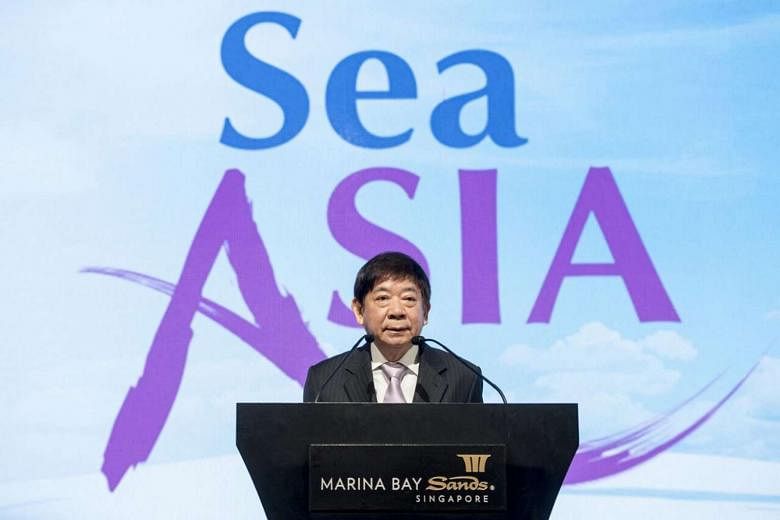More steps are under way to ready Singapore's maritime industry for a future in which digitalisation disrupts and transforms global transportation and supply chains, said Coordinating Minister for Infrastructure Khaw Boon Wan yesterday.
These efforts include two new digital platforms that will be rolled out to improve trade processes here.
Speaking at the opening of Sea Asia, a major industry conference, Mr Khaw noted the lines between shipping, e-commerce and logistics are blurring. "For example, Amazon will soon be launching its own shipping and logistics operations. What does this spell for shipping companies when e-retail giants have in-house shipping operations?
"Freight forwarders, too, would have noticed the Maersk and CMA CGM partnerships with Alibaba to allow shippers to book space on container ships online."
He said that shifting shipping alliances, changing distribution methods and evolving global trade routes may mean it is more important to be part of an inter-connected port network than to compete to be the biggest hub port.
"Rather than seeing each other as competitors, we may have to learn to collaborate more with one another," said Mr Khaw, who is also Transport Minister.
-
7%
What the maritime sector contributes to the country's economy .
170k
Number of workers the sector employs.
One of the two digital platforms under development is the next-generation National Trade Platform, an integrated, one-stop digital platform connecting shippers, shipping lines, the port, government agencies and logistics players.
The other is the Maritime Single Window by the Maritime and Port Authority of Singapore (MPA) to offer a single portal access to submit documents for port clearance.
"These initiatives will enable Singapore to play a bigger role in new areas such as e-fulfilment and multimodal connectivity."
Mr Khaw added the Government is also taking steps to help firms here develop capabilities to succeed.
The MPA's enhanced Maritime Cluster Fund, for example, now provides more co-funding for companies that want to use technology to optimise their processes or transform their business model.
The agency is also working with industry partners to groom the next generation of start-ups in the e-maritime and e-logistics space.
Mr Khaw also stressed it is important to prepare Singaporeans for this transformation, given that the jobs of tomorrow will be "more knowledge-intensive, and require new skill sets and mindsets".
To this end, the MPA has enhanced co-funding for training in areas such as data analytics and new maritime technologies, which will reinforce the quality of the country's maritime workforce, he said.
Singapore, a leading maritime capital, has been taking steps to strengthen its position as the world's largest container trans- shipment hub, including building a new mega port in Tuas.
The maritime sector contributes about 7 per cent to the local economy with over 170,000 workers.
DBS Group Holdings chief executive Piyush Gupta, a panel speaker, said mindsets need to change to embrace digitalisation opportunities.
"The maritime industry needs to create an environment that allows for its people to experiment with new technologies and learn how to use them," he said.
Sea Asia at Marina Bay Sands, which wraps up tomorrow, is Asia's largest maritime and offshore conference and exhibition. It is held every other year in conjunction with Singapore Maritime Week.


